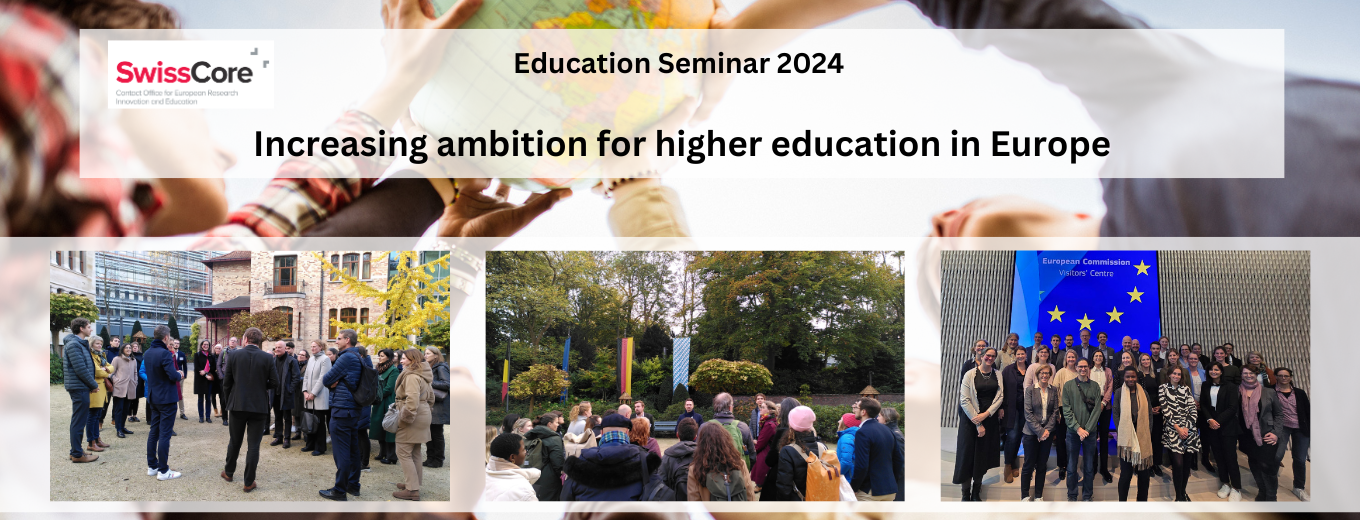Swiss Education stakeholders had fruitful discussions to develop higher education cooperation as Swiss government aims to rejoin Erasmus+ from 2027.
Between 04 and 06 of November, the Swiss education community gathered in Brussels for the annual SwissCore Education Seminar. This year’s seminar was held under the theme ‘Increasing ambition for higher education in Europe’. Around 35 participants – mostly representing Higher Education Institutions (HEIs), but also the State Secretariat for Education, Research and Innovation (SERI), Movetia, the Swiss mobility agency, and students’ representatives – met and discussed ongoing education policy initiatives at European level with speakers from Brussels.
During the first day of the seminar, Swiss education actors familiarised themselves with the current status-quo of Swiss-EU collaboration in education. To this end, they received an update on the ongoing negotiations for a reassociation to the European Education programme Erasmus+ which were kicked off in March 2024 (see SwissCore article). Later on, the delegation was welcomed at the Representation of the Free State of Bavaria to discover how Bavaria and Germany voice their interests towards the EU institutions. In the evening, Minister and Deputy Head of the Swiss Mission to the EU Alexander Renggli hosted the delegation at the Mission, where he praised the hard work that is being done to reach a fruitful and qualitative deal with the European Union. Echoing the Minister’s words, the Swiss Federal Government evaluated the status on the negotiations on 6 November 2024 and stated its official aim to be associated to the Erasmus+ programme from 2027.
The second day started with a visit at the European Commission (EC) to discuss their priorities and work on education policies. During three sessions, Seminar participants could ask their questions to the EC on the European Degree (label) proposal (see SwissCore article), the future of the current Erasmus+ programme and its successor programme, as well as the work of the EC on the use of AI in education. As the Council Recommendation on attractive and sustainable careers in Higher Education is almost at the end of the revision process by the Council of the EU, the EC plans to work on the criteria for the European Degree (label) with the Member States from spring 2025 onwards. For the end of the current Erasmus+ programme, the EC is trying to make the programme more inclusive with, for example, grants adapting to inflation and adding a travel support top-up, while European Universities alliances should be able to apply for an additional 2 years of funding in 2026 and 2027. When it comes to the Erasmus+ successor programme, the EC estimates that its budget needs to be double for the next programme period (between 2028-35) in order to sustain current activities. They also believe that the share allocated to Higher Education will be proportionally smaller compared to the current programme period, as vocational education and training (VET), youth and sports will be emphasised. Regarding the use of AI in education, the EC presented how the technology impacts education, how students are using it as well as examples from HEIs that are developing a structured approach towards AI.
In the afternoon, participants of the Education Seminar headed towards Usquare, a new building structure shared by the Université libre de Bruxelles (ULB) and the Vrije Universiteit Brussels (VUB), to learn about different aspects and impacts of internationalisation on the Higher Education Institutions strategies. There, Swiss HEIs familiarised themselves with the newly created Community of Practice for the European Universities Initiative (EUI), named FOR-EU4ALL: 60 alliances will work together to build a structured and systemic cooperation between them and beyond. After that presentation, both ULB and VUB presented the innovative teaching methods which some teachers developed with their peers from their respective alliances, CIVIS and EUTOPIA. Among the best practices highlighted, ULB presented their work on Blended Intensive Programmes (BIPs) and VUB’s alliance, EUTOPIA, introduced their approach for a label recognising teachers’ efforts of developing innovative and intercultural teaching modes.
The last day of the visit was tailored to staff members whose home institution is a member of a European University alliance. Connecting directly to the discussions of the previous day, on the next steps for funding and Swiss perspectives on the EUI, the participants took part in a workshop on the promotion of Swiss involvement in the alliances. This allowed participants to share their views and develop next steps in the collaboration between Swiss and European HEIs.

